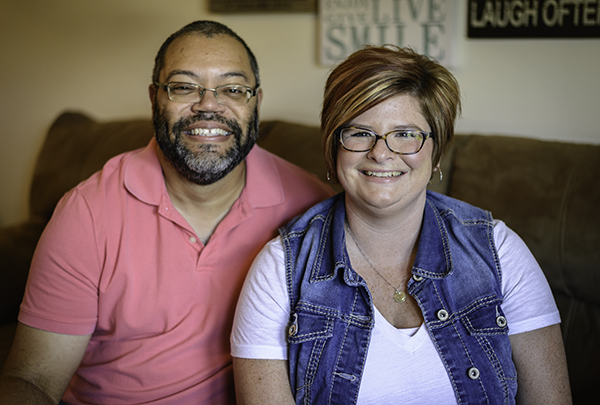“Let’s just try it out”: Becoming Foster Parents
June 2017 · Foster Care / Adoption
“Let’s just try it out,” were the words Ginny Samples used to get Chuck into foster parent classes. “We don’t have to decide now, but at least we’ll see if it’s where we need to be.” By the third session, they knew.
“In the classes, they tell you all kinds of stuff to watch out for, what to expect with foster children,” said Chuck. “We realized that a lot of those things are what you’d see in any family. It broadened our focus beyond adoption. We began to think less about what we want as a family and more about what these kids need.”
Ginny’s co-worker at Emporia Middle School was in the process of adopting her foster child and had suggested foster care as an option for the Samples. Unable to have more children after the birth of their daughter, they’d been thinking about adoption. Isabella wanted siblings. And Ginny and Chuck wanted a larger family.
But soon after starting the classes, they knew they would foster for fostering’s sake – whether they eventually adopted or not.
“There’s just so much need,” said Ginny. “I’ve worked with lots of middle school-aged foster kids, and there’s nothing wrong with them. People often think they’re bad kids, but they’ve done nothing wrong. They’re just in a bad situation.”
So they discussed it with Isabella, who was immediately onboard. At six years old, she already understood that her parents were proposing helping children.

“We warned her that they might not stay long, that they could leave at any time to go back home,” said Ginny. “But she was perfectly fine with that. I think she probably wanted playmates more than anything.”
Not long after licensing in August 2014, the Samples received a call from Saint Francis saying they had a 2-year-old boy in need of a place to stay. What’s more, he had a sister, yet to be born, but who would also need a home – mostly likely after spending a couple months in the hospital. Could they handle it? They had the weekend to decide. Chuck and Ginny went for it.
That was more than three years ago, and they still have the siblings, now five and three years old. They’ve cared for them while providing emergency and respite foster care for several other children.
“When they came into our house, Isabella took care of them and showed them around,” said Ginny. “She’s very caring and loves them so much. She’s always treated them like siblings.”
And now they are.
About a year into fostering, the couple began to think it might be helpful to share experiences and advice with other foster parents. They asked if there was support group in town and learned there wasn’t. They mentioned it to their Saint Francis caseworker, who said, “Let’s start one.”
“She helped us get the word out, and we started having support group meetings right after our quarterly training meetings,” said Ginny. “Anyone at the training is welcome to stay for the support group. There are no case managers, no Saint Francis staff. Just foster parents. We all voice our opinions and support each other. It’s been so nice to know that we’re not alone. It’s helped tremendously.”
“It just keeps growing,” added Chuck. “It’s given us a place to bounce ideas off each other, gripe, celebrate, hug, cry, cuss, whatever we need. And it gives us the language to share our story with others. We were a bit surprised to learn that these kids just need love, stability, and guidance more than anything else. I think if potential foster parents could see that, more would be receptive to trying it.”
“Just try it out,” said Ginny. “The way I look at it, you shouldn’t say ‘no’ until you’ve at least tried the classes. You don’t have to be perfect. We’re certainly not. And, no, it’s not easy – especially when they leave. I hear people say they could never foster because they’d become too attached. But I tell them, ‘If you’re not attached, you’re not doing it right.”

